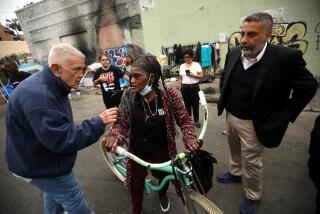Robert F. Peckham; U.S. Judge in Landmark Cases
- Share via
SAN FRANCISCO — U.S. District Judge Robert F. Peckham, who issued landmark orders on police desegregation and IQ testing during a 23-year judicial career, died Tuesday of complications after heart surgery at Stanford University Hospital, a court spokesman said. He was 72.
Peckham was appointed to the federal bench by President Lyndon B. Johnson in 1966 after seven years as a Santa Clara County Superior Court judge. He was chief judge of the San Francisco-based court from 1976 to 1988, when he went into semi-retirement and transferred to San Jose.
Among his cases was a 1973 suit against the predominantly Anglo male San Francisco Police Department by a group of minorities and women called Officers for Justice. In 1979 Peckham ordered the department to hire 50% minorities and 20% women for the next 10 years. He extended the order a decade later after expressing “disappointment and sadness” at the department’s progress.
Peckham also issued an order in 1985 setting ground rules for the desegregation of the San Jose Unified School District.
One of his cases affected schools across California.
In a suit by a group of black parents, Peckham ruled in 1979 that IQ tests had a built-in bias, resulting in improper classification of some blacks as mentally retarded. He prohibited their use statewide for diagnosing blacks as retarded, an order he broadened in 1986 to forbid use of the tests to identify blacks as learning-disabled or to assess their learning disabilities.
But Peckham withdrew the 1986 order last September after another group of black parents sued to allow their children to get IQ tests to evaluate learning disabilities.
He also presided over the trial of Larry Layton, a disciple of Peoples Temple leader Jim Jones. Layton, the only temple member prosecuted in the United States, was convicted of conspiring with Jones in the murder of California Rep. Leo Ryan during a fact-finding trip to the temple’s compound in South America shortly before the deaths of more than 900 temple members.
He was chairman of a U.S. Judicial Conference committee whose recommendations have led to the first-ever limited use of cameras in federal courts.
More to Read
Sign up for Essential California
The most important California stories and recommendations in your inbox every morning.
You may occasionally receive promotional content from the Los Angeles Times.













